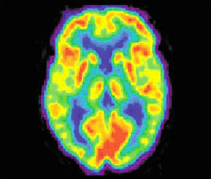The Takeaway
- When we miss sleep in order to keep up with our 24/7 world, we pay a price with our ability to learn, our health and safety, and our quality of life
- It may seem obvious that sleep is beneficial. Even without fully grasping what sleep does for us, we know that going without sleep for too long makes us feel terrible, and that getting a good night's sleep can make us feel ready to take on the world. Scientists have gone to great lengths to fully understand sleep's benefits. In studies of humans and other animals, they have discovered that sleep plays a critical role in immune function, metabolism, memory, learning, and other vital functions.

Why Do We Sleep Anyway?
.wrap { width:50% } .takeaway { border-style: solid; border-width: 15px; border-color: #95acce; } .margin { margin-left:1em; margin-right:1em; } .justifydiv { text-align: justify; } .footer { font-size: 12px }
The Takeaway
- Our bodies regulate sleep in much the same way that they regulate eating, drinking, and breathing. This suggests that sleep serves a similar critical role in our health and well-being.
- Although it is difficult to answer the question, "Why do we sleep?" scientists have developed several theories that together may help explain why we spend a third of our lives sleeping.
- Understanding these theories can help deepen our appreciation of the function of sleep in our lives.
Hunger and Eating, Sleepiness and Sleep
 As with eating well, good sleep is a staple of optimal health.
As with eating well, good sleep is a staple of optimal health.
While we may not often think about why we sleep, most of us acknowledge at some level that sleep makes us feel better. We feel more alert, more energetic, happier, and better able to function following a good night of sleep. However, the fact that sleep makes us feel better and that going without sleep makes us feel worse only begins to explain why sleep might be necessary.
One way to think about the function of sleep is to compare it to another of our life-sustaining activities: eating. Hunger is a protective mechanism that has evolved to ensure that we consume the nutrients our bodies require to grow, repair tissues, and function properly. And although it is relatively easy to grasp the role that eating serves— given that it involves physically consuming the substances our bodies need—eating and sleeping are not as different as they might seem.
Both eating and sleeping are regulated by powerful internal drives. Going without food produces the uncomfortable sensation of hunger, while going without sleep makes us feel overwhelmingly sleepy. And just as eating relieves hunger and ensures that we obtain the nutrients we need, sleeping relieves sleepiness and ensures that we obtain the sleep we need. Still, the question remains: Why do we need sleep at all? Is there a single primary function of sleep, or does sleep serve many functions?
An Unanswerable Question?
Scientists have explored the question of why we sleep from many different angles. They have examined, for example, what happens when humans or other animals are deprived of sleep. In other studies, they have looked at sleep patterns in a variety of organisms to see if similarities or differences among species might reveal something about sleep's functions. Yet, despite decades of research and many discoveries about other aspects of sleep, the question of why we sleep has been difficult to answer.
The lack of a clear answer to this challenging question does not mean that this research has been a waste of time. In fact, we now know much more about the function of sleep, and scientists have developed several promising theories to explain why we sleep. In light of the evidence they have gathered, it seems likely that no single theory will ever be proven correct. Instead, we may find that sleep is explained by two or more of these explanations. The hope is that by better understanding why we sleep, we will learn to respect sleep's functions more and enjoy the health benefits it affords.
This essay outlines several current theories of why we sleep. To learn more about them, be sure to check out the References at the end of this essay. There you'll find links to articles by researchers who are studying this fascinating question.
Theories of Why We Sleep
Inactivity Theory
 Arctic Fox at Rest
Arctic Fox at Rest
One of the earliest theories of sleep, sometimes called the adaptive or evolutionary theory, suggests that inactivity at night is an adaptation that served a survival function by keeping organisms out of harm’s way at times when they would be particularly vulnerable. The theory suggests that animals that were able to stay still and quiet during these periods of vulnerability had an advantage over other animals that remained active. These animals did not have accidents during activities in the dark, for example, and were not killed by predators. Through natural selection, this behavioral strategy presumably evolved to become what we now recognize as sleep.
A simple counter-argument to this theory is that it is always safer to remain conscious in order to be able to react to an emergency (even if lying still in the dark at night). Thus, there does not seem to be any advantage of being unconscious and asleep if safety is paramount.
Energy Conservation Theory
Although it may be less apparent to people living in societies in which food sources are plentiful, one of the strongest factors in natural selection is competition for and effective utilization of energy resources. The energy conservation theory suggests that the primary function of sleep is to reduce an individual’s energy demand and expenditure during part of the day or night, especially at times when it is least efficient to search for food.
 Lions conserving energy
Lions conserving energy
after a meal.
© Stuart Quan
Research has shown that energy metabolism is significantly reduced during sleep (by as much as 10 percent in humans and even more in other species). For example, both body temperature and caloric demand decrease during sleep, as compared to wakefulness. Such evidence supports the proposition that one of the primary functions of sleep is to help organisms conserve their energy resources. Many scientists consider this theory to be related to, and part of, the inactivity theory.
Restorative Theories
Another explanation for why we sleep is based on the long-held belief that sleep in some way serves to "restore" what is lost in the body while we are awake. Sleep provides an opportunity for the body to repair and rejuvenate itself. In recent years, these ideas have gained support from empirical evidence collected in human and animal studies. The most striking of these is that animals deprived entirely of sleep lose all immune function and die in just a matter of weeks. This is further supported by findings that many of the major restorative functions in the body like muscle growth, tissue repair, protein synthesis, and growth hormone release occur mostly, or in some cases only, during sleep.
Other rejuvenating aspects of sleep are specific to the brain and cognitive function. For example, while we are awake, neurons in the brain produce adenosine, a by-product of the cells' activities. The build-up of adenosine in the brain is thought to be one factor that leads to our perception of being tired. (Incidentally, this feeling is counteracted by the use of caffeine, which blocks the actions of adenosine in the brain and keeps us alert.) Scientists think that this build-up of adenosine during wakefulness may promote the "drive to sleep." As long as we are awake, adenosine accumulates and remains high. During sleep, the body has a chance to clear adenosine from the system, and, as a result, we feel more alert when we wake. Consistent with the need to remove buildup of chemicals in the brain are recent studies in experimental animals demonstrating a previously unknown drainage pathway in the brain now known as the glymphatic system. This network of "tunnels" surrounding existing blood vessels promotes the clearance of substances from the brain. Its efficiency is enhanced during sleep; studies have shown that elimination of toxins via this pathway such as beta amyloid, a protein associated with Alzheimer's Disease is reduced with sleep deprivation.
Synaptic Homeostasis Theory
A more recent theory is that sleep is necessary to reduce neural connections or synapses in the brain. It proposes that during the day, there is an increase in the number of synapses as a result of daily activity. If allowed to continuously accumulate, the brain would become overloaded similar to a hard drive on a computer approaching its capacity. Therefore, it is necessary to prune unnecessary synapses and strengthen essential ones. Supporting this theory are studies showing that there is shrinking and expansion of synapses with sleep and wakefulness in experimental animals.
Brain Plasticity Theory
 PET scan showing brain activity
PET scan showing brain activity
in a 20-year-old.
One of the most recent and compelling explanations for why we sleep is based on findings that sleep is correlated to changes in the structure and organization of the brain. This phenomenon, known as brain plasticity, is not entirely understood, but its connection to sleep has several critical implications. It is becoming clear, for example, that sleep plays a critical role in brain development in infants and young children. Infants spend about 13 to 14 hours per day sleeping, and about half of that time is spent in REM sleep, the stage in which most dreams occur. A link between sleep and brain plasticity is becoming clear in adults as well. This is seen in the effect that sleep and sleep deprivation have on people's ability to learn and perform a variety of tasks.
Although these theories remain unproven, science has made tremendous strides in discovering what happens during sleep and what mechanisms in the body control the cycles of sleep and wakefulness that help define our lives. While this research does not directly answer the question, "Why do we sleep?" it does set the stage for putting that question in a new context and generating new knowledge about this essential part of life.
References
- Frank MG. The mystery of sleep function: current perspectives and future directions. Rev Neurosci. 2006;17(4):375-92. doi: 10.1515/revneuro.2006.17.4.375.
- Jessen NA, Munk AS, Lundgaard I, Nedergaard M. The Glymphatic System: A Beginner's Guide. Neurochem Res. 2015;40(12):2583-99. doi: 10.1007/s11064-015-1581-6.
- Porkka-Heiskanen T. Adenosine in sleep and wakefulness. Ann Med. 1999;31(2):125-9. doi: 10.3109/07853899908998788.
- Siegel JM. 2005. Clues to the functions of mammalian sleep. Nature. 437:1264-1271.
- Tononi G, Cirelli C. Sleep function and synaptic homeostasis. Sleep Med Rev. 2006;10(1):49-62. doi: 10.1016/j.smrv.2005.05.002.
Sleep, Learning and Memory
} .takeaway { border-style: solid; border-width: 15px; border-color: #95acce; } .margin { margin-left:1em; margin-right:1em; } .justifydiv { text-align: justify; } .footer { font-size: 12px }
The Takeaway
- Research suggests that sleep plays an important role in memory, both before and after learning a new task.
- Lack of adequate sleep affects mood, motivation, judgment, and our perception of events.
- Although there are some open questions about the specific role of sleep in forming and storing memories, the general consensus is that consolidated sleep throughout a whole night is optimal for learning and memory.
 
The Learning Process and Sleep
 Healthy sleep is essential for optimal learning and memory function.
Healthy sleep is essential for optimal learning and memory function.
Sleep, learning, and memory are complex phenomena that are not entirely understood. However, animal and human studies suggest that the quantity and quality of sleep have a profound impact on learning and memory. Research suggests that sleep helps learning and memory in two distinct ways. First, a sleep-deprived person cannot focus attention optimally and therefore cannot learn efficiently. Second, sleep itself has a role in the consolidation of memory, which is essential for learning new information.
Although the exact mechanisms are not known, learning and memory are often described in terms of three functions. Acquisition refers to the introduction of new information into the brain. Consolidation represents the processes by which a memory becomes stable. Recall refers to the ability to access the information (whether consciously or unconsciously) after it has been stored.
Each of these steps is necessary for proper memory function. Acquisition and recall occur only during wakefulness, but research suggests that memory consolidation takes place during sleep through the strengthening of the neural connections that form our memories. Although there is no consensus about how sleep makes this process possible, many researchers think that specific characteristics of brainwaves during different stages of sleep are associated with the formation of particular types of memory.
Dr. Robert Stickgold discusses how sleep plays a role in memory, both before and after a new learning situation.
Sleep researchers study the role of sleep in learning and memory formation in two ways. The first approach looks at the different stages of sleep (and changes in their duration) in response to learning a variety of new tasks. The second approach examines how sleep deprivation affects learning. Sleep deprivation can be total (no sleep allowed), partial (either early or late sleep is deprived), or selective (specific stages of sleep are deprived).
Sleep Stages and Types of Memory
Different types of memories are formed in new learning situations. Scientists are exploring whether there is a relationship between the consolidation of different types of memories and the various stages of sleep.
The earliest sleep and memory research focused on declarative memory, which is the knowledge of fact-based information, or "what" we know (for example, the capital of France, or what you had for dinner last night). In one research study, individuals engaged in an intensive language course were observed to have an increase in rapid-eye-movement sleep, or REM sleep. This is a stage of sleep in which dreaming occurs most frequently. Scientists hypothesized that REM sleep played an essential role in the acquisition of learned material. Further studies have suggested that REM sleep seems to be involved in declarative memory processes if the information is complex and emotionally charged, but probably not if the information is simple and emotionally neutral.
Researchers now hypothesize that slow-wave sleep (SWS), which is deep, restorative sleep, also plays a significant role in declarative memory by processing and consolidating newly acquired information. Studies of the connection between sleep and declarative memory have had mixed results, and this is an area of continued research.
 Sleep plays a major role in the ability to learn new tasks that require motor coordination and performance.
Sleep plays a major role in the ability to learn new tasks that require motor coordination and performance.
Research has also focused on sleep and its role in procedural memory—the remembering "how" to do something (for example, riding a bicycle or playing the piano). REM sleep seems to plays a critical role in the consolidation of procedural memory. Other aspects of sleep also play a role: motor learning seems to depend on the amount of lighter stages of sleep, while certain types of visual learning seem to depend on the amount and timing of both deep, slow-wave sleep (SWS) and REM sleep.
The Impact of Sleep Deprivation on Learning and Performance
Another area that researchers study is the impact that a lack of adequate sleep has on learning and memory. When we are sleep deprived, our focus, attention, and vigilance drift, making it more difficult to receive information. Without adequate sleep and rest, over-worked neurons can no longer function to coordinate information properly, and we lose our ability to access previously learned information.
Dr. Robert Stickgold describes studies that show the importance of sleep in memory consolidation after learning a new task.
In addition, our interpretation of events may be affected. We lose our ability to make sound decisions because we can no longer accurately assess the situation, plan accordingly, and choose the correct behavior. Judgment becomes impaired.
Being chronically tired to the point of fatigue or exhaustion means that we are less likely to perform well. Neurons do not fire optimally, muscles are not rested, and the body’s organ systems are not synchronized. Lapses in focus from sleep deprivation can even result in accidents or injury.
For more information about how sleep deprivation affects performance, see Sleep, Performance, and Public Safety.
Low-quality sleep and sleep deprivation also negatively impact mood, which has consequences for learning. Alterations in mood affect our ability to acquire new information and subsequently to remember that information. Although chronic sleep deprivation affects different individuals in a variety of ways (and the effects are not entirely known), it is clear that a good night’s rest has a strong impact on learning and memory.
Open Questions
Although current research suggests that sleep is essential for proper memory function, there are unanswered questions, as in any area of active scientific inquiry. For example, certain medications will significantly, if not entirely, suppress REM sleep. However, patients taking these medications do not report any memory impairment. Similarly, injuries or disease causing lesions to the brainstem (and subsequently eliminating a person’s REM sleep) have not resulted in any obvious loss of the ability to form new memories. Exploration and debate continue.
 Mice exhibit an increase in REM sleep after completing a new course through a maze.
Mice exhibit an increase in REM sleep after completing a new course through a maze.
© Tetra Images/Corbis
Not all researchers are convinced that sleep plays as prominent a role in memory consolidation as others believe. In experiments in which animals completed a course through a complicated maze, the animals' amount of REM sleep increased after performing the task. Some researchers believe that the increase in REM sleep reflects an increased demand on the brain processes that are involved in learning a new task. Other researchers, however, have suggested that any changes in the amount of REM sleep are due to the stress of the task itself, rather than a functional relationship to learning.
Researchers are likewise split with regard to the impact of sleep deprivation on learning and memory. For example, rats often perform much worse on learning tasks after being selectively deprived of REM sleep. This suggests that REM sleep is necessary for the animals’ ability to consolidate the memory of how to perform the task. Some scientists have argued that the observed differences in learning are not actually due to the lack of REM sleep, but may be due to the animals not being as well rested because they were deprived a portion of their sleep.
Summary
In the view of many researchers, evidence suggests that various sleep stages are involved in the consolidation of different types of memories and that being sleep deprived reduces one’s ability to learn. Although open questions (and debate) remain, the overall evidence suggests that adequate sleep each day is very important for learning and memory.
References
- Ellenbogen JM, Payne JD, Stickgold R. The role of sleep in declarative memory consolidation: passive, permissive, active or none? Curr Opin Neurobiol. 2006 Dec;16(6):716-22. doi: 10.1016/j.conb.2006.